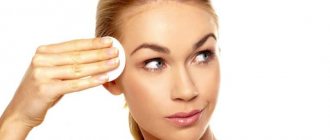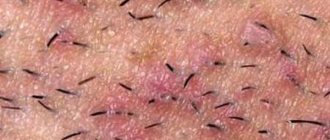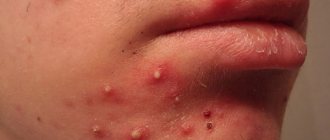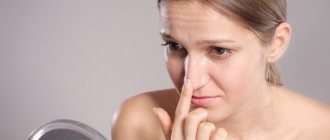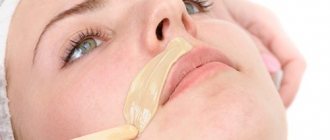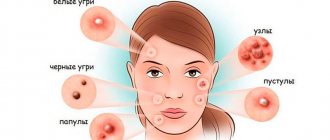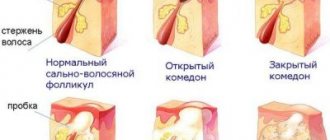- Acne at 25-26 years old in women: causes
- How to get rid of acne at 25 - 26 years old
There are quite a lot of opinions that acne is a problem that only affects teenagers. People generally believe that the occurrence of acne decreases after crossing adolescence. Although this may be true in some cases, many women experience acne, especially in their thirties. Let's explain the causes of acne in women after adolescence.
Acne, although a skin condition, has a lot to do with your diet, lifestyle and overall health. Hormonal imbalances, digestive problems, other health conditions, poor eating habits, unhealthy lifestyle and of course stress can be some of the influencing factors.
Pimples* on the face: causes of occurrence in women104
Women's health and skin condition largely depend on hormonal levels. The male hormone testosterone is responsible for the processes that occur in the epidermis. In women, it is produced by the adrenal glands and ovaries.
With increased secretion of androgens, the sebaceous glands begin to produce too much sebum. Gradually it mixes with particles of dirt, dead cells, cosmetics and undergoes oxidation under the influence of oxygen. This is how open comedones are formed.
Hypersensitivity to steroid hormones in women over 30 years of age is one of the main causes of acne. An increase in androgen activity disrupts the water-lipid balance and causes clogged pores. Gradually, against the background of a slowdown in the process of sebum removal, bacteria begin to multiply in the sebaceous glands, and foci of inflammation appear on the skin.
An active increase in the level of androgens and the tendency to form acne is especially pronounced in the second phase of the menstrual cycle. Before the onset of menstruation, the level of steroid hormones in the body sharply increases, which activate comedogenic processes.
1.Sweat
What is the problem?
All physical activity causes sweat, but people may sweat especially heavily during sex. “Sweat itself won’t cause acne,” says Dr. Sejal Shah, a dermatologist and RealSelf contributor. “But sweat can mix with makeup, bacteria, oil, and other impurities on the skin.”
If you leave this whole mix of sweat, makeup, and who knows what else on your skin, your pores can get pretty clogged.
What to do?
“Think of sex as going to the gym,” says Dr. Shah.”
Try cleansing your skin before and after to prevent acne. Of course, exfoliation isn't the best foreplay, so if pre-sex beauty treatments aren't in your plans, at least make sure you wash everything off after (or during) the shower.
Dr. Golubets recommends using a gentle foaming cleanser or something with salicylic acid to unclog pores.
Back to contents
Why do women get acne* on their faces? 104
In adult women, acne is often associated with hormonal diseases of the reproductive system (mastopathy, polycystic ovary syndrome, fibroids, etc.). In some cases, acne is the first indication of the presence of hyperandrogenism. If you have acne on your face, it is important to determine the true reasons for its formation. The fact is that every disease that causes rashes requires specialized, often complex, treatment.
In modern medicine and cosmetology, a number of hormonal factors are identified that lead to the formation of late acne in women:
- Changes in hormonal levels before menstruation. An increase in progesterone levels activates the secretion of sebum, which in turn provokes the formation of premenstrual acne.
- Reception OK. Oral contraceptives contain substances that change the course of the natural processes of hormone production in the female body. In some cases, during use or at the stage of discontinuation of OCs, sebum production is activated, which leads to the formation of acne.
- Endocrine diseases. Dysfunction of the adrenal cortex, pathologies of the pituitary gland and other pathologies of the endocrine system cause excessive acne formation in some women.
- Gynecological diseases. Pathologies of the reproductive system are often a provoking factor in the development of acne in women. In particular, in many patients aged 30-40 years, the appearance of acne is associated with polycystic ovary syndrome.
- Pregnancy. During pregnancy, a woman's body undergoes active hormonal changes, so the appearance of acne during this period is absolutely normal. Especially in the first trimester.
- Menopausal syndrome. Usually observed during the decline of childbearing functions. It is caused by a gradual decrease in the size of the ovaries and uterus, the disappearance of menstrual bleeding. Hormonal changes that occur in the body during menopause often provoke excessive sebum secretion and, as a result, acne.
How to get rid of acne at 25 - 26 years old
Poll: When did your acne appear? (Number of votes: 4295)
I've been suffering all my life
It's been a couple of years now
About a few months
Recently
To vote, click on the desired answer. results
"It's important to cleanse your skin every day," says dermatologist Doris Day, MD, of Lenox Hill Hospital in New York City. Follow these steps to improve your skin and keep your skin clear of acne:
- Wash your face with antibacterial soap no more than twice a day;
- Use cool or warm water and a gentle cleanser;
- Use a daily moisturizer on your face after cleansing.
Types of products you can use to get rid of acne include:
Cleansers that are designed to remove dirt, makeup, and impurities from your face A good cleanser will also allow other skin products to reach your skin and work much better and more effectively. Choose gentle cleansers that won't dry out your skin, says Johnette Carey, MD, professor of dermatology. at the University of Miami Miller School of Medicine.
What to do if acne occurs?
To get rid of acne, you must first determine the true causes of the pathology. Before performing cosmetic procedures, experts advise visiting a dermatologist, endocrinologist, gastroenterologist and, of course, a gynecologist. Treatment of acne caused by gynecological or endocrine diseases includes eliminating the primary causes of the rash.
To help the body cope with acne faster, cosmetologists recommend reviewing your diet. Changing gastronomic habits (giving up sweets, flour, spicy, salty, etc.) can have a positive effect on the condition of the face.
4.Hair products
What is the problem?
During sex, all parts of the body, including hair, rub against each other.
“Certain hair products can cause acne,” says Dr. Golubets. “People sweat during sex, and anything in their hair can get on their face.”
While some chemicals and other ingredients may be good for your locks, they can also be harmful to your skin. Silicone, acrylates and various fats are especially influential.
What to do?
D. Golubets strongly advises consumers to be interested in the composition of all the products they use. Take the time to read the label. If there are a lot of chemicals there, it is better not to use such a product.
“They don’t stay the same,” explains Golubets. “They can release hormones and cause damage to the skin.”
D. Friedman advises selecting ingredients depending on skin type. For example, alcohol-based products can dry out the skin, while oil-based products can clog pores. It's up to you to decide what's least damaging to your skin, but to avoid it all, tie your hair in a ponytail before a night of passion.
Back to contents
Acne on the face: causes and treatment
There are many reasons for the occurrence of acne: the use of cosmetics with comedogenic ingredients, stress, genetic predisposition, taking medications (for example, anabolic steroids), gastrointestinal pathologies, etc.31,49,80. When prescribing treatment, the dermatologist also takes into account why the rash appeared. In the treatment of mild to moderate acne, azelaic acid, for example, Azelik®5,9, can be used. The drug is used twice a day5. It is applied to clean, dry skin5.
*acne
3. Dirty bed linen
What is the problem?
If your partner's room is strewn with chip bags, or if you have to wade through piles of old towels and dirty clothes to get to your bed, it's more than likely that the sheets aren't fresh either.
"Leaving your sheets dirty means giving acne a chance, thanks to dead skin cells, sebum and bacteria that may be on the fabric," says Dr. Kaleroi Papantoniou, a cosmetic dermatologist.
Dr. Golubets says that pillowcases are especially prone to bacteria.
They accumulate sebum, hair and many different bacteria. What to do?
If you spend the same amount of time in both your bed and your partner's bed, then you share this responsibility together. “It's best to use cotton sheets and wash them twice a week,” advises Dr. Shah. If your partner doesn't want to bother with it, at least do it with your sheets.
Back to contents
Salon treatments
Treatment of skin diseases must be comprehensive. With a competent approach to the use of salon procedures, you can get rid of acne and improve the health of your facial skin.
- vacuum cleaning;
- ultrasonic cleaning;
- mechanical cleaning;
- chemical (peeling) cleaning.
All these procedures are carried out exclusively in beauty salons and have a certain sequence. Before cleaning is done, the specialist determines the patient’s allergic reactions to certain components of the masks. The darsonvalization procedure, which can relieve inflammation and heal wounds, is also considered widely known. Darsonval helps get rid of scars and acne using an electrical impulse. This effect can improve skin tone, get rid of acne and improve complexion. Cryomassage with liquid nitrogen is also considered a beneficial procedure, thanks to which you can quickly get rid of skin diseases (pimples and acne). The procedure is based on the effect of liquid nitrogen on the affected areas of the skin. Cryomassage and darsonvalization for adult women must be carried out by qualified specialists and dermatologists.
News MirTesen
Sex against acne
Be that as it may, sex is not a panacea when it comes to acne.
Cases where, in the absence of regular sexual activity, the skin remains clear are not so rare. The same goes for cases where acne does not disappear with an active sexual life. For a man, the line between “good/bad” at this point is very thin. It is in men that hormones that affect skin health positively and negatively are produced during sex in approximately equal quantities (women have more “good” hormones). That is, the conclusion suggests itself: among representatives of the stronger half of humanity, acne can appear both from a lack of and from an excess of sex. Often, the problem of skin health cannot be treated only by normalizing sex life. Often the reasons can be completely different, and only specialists can help figure them out. Thus, acne can appear due to diseases of the internal organs; they are often caused by problems with the gastrointestinal tract. It is difficult to understand this on your own (especially if there are no external obvious signs). For people with a genetic predisposition to acne, the problem lies even deeper. Often, to determine the source of the problem, you have to take tests and conduct additional examinations. In any case, only a doctor can help find the root cause and help eliminate it.
How to cure acne in adults?
The pattern of acne in adults is milder than in adolescents, but it is chronic, which makes treatment difficult. Typically, complete healing of acne in adults is achieved through long-term therapy, requiring a combination of antibiotic treatment with appropriate care and diet.
The best results are achieved by combining oral and topical antibiotics with preparations containing azelaic acid, salicylic acid and sulfur. The ultimate solution is to use a powerful vitamin A derivative, isotretinoin.


